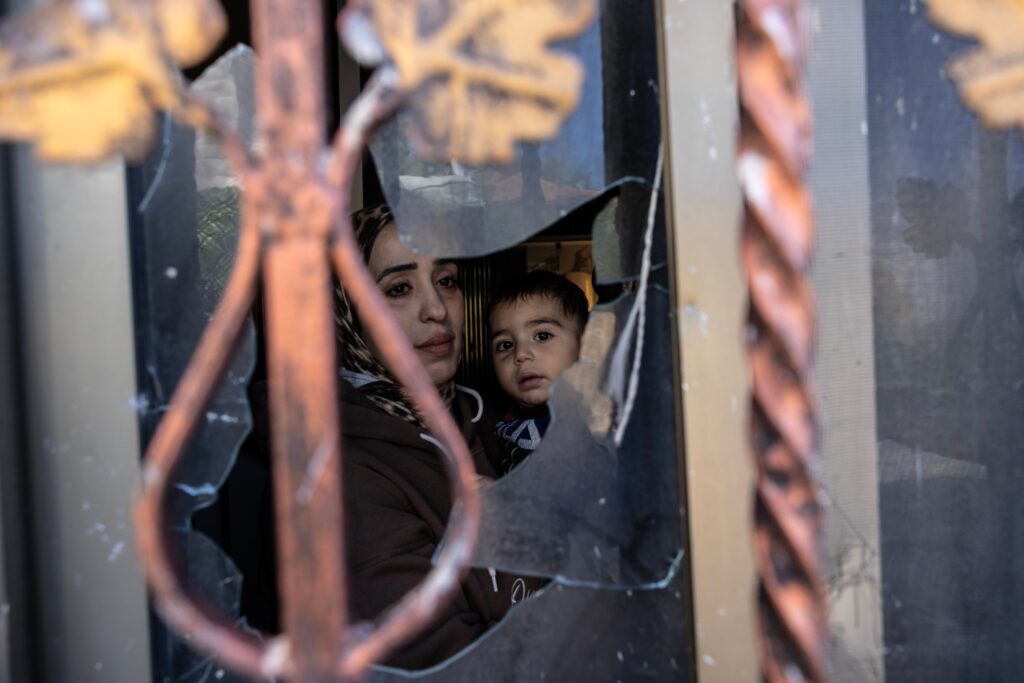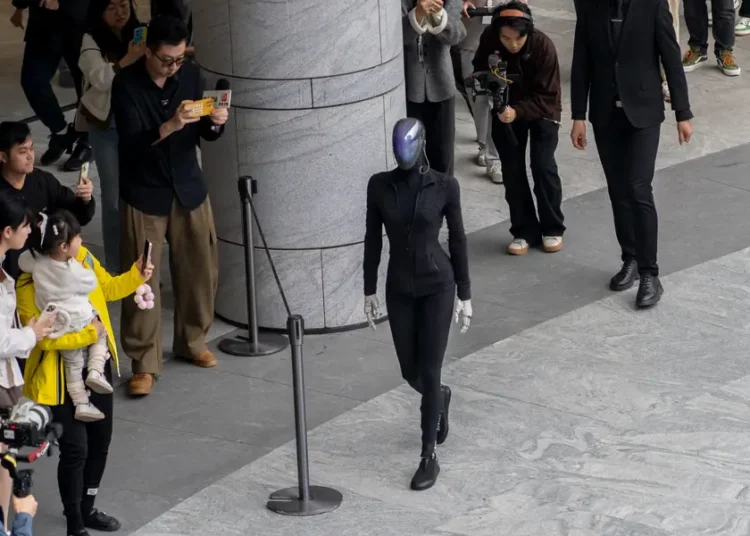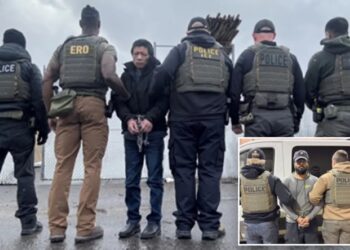JABA, West Bank — Israeli political and military officials are scrambling to contain a recent wave of settler attacks across the West Bank, warning against further violence targeting Palestinian communities as vigilantes have rampaged through local villages, beating residents, torching a mosque and assaulting and injuring Israeli security forces who helped demolish an illegal outpost near the flash point city of Hebron this week.
The attacks, carried out by roving gangs of masked men and boys, have underscored the extent to which the Israeli government has allowed Jewish settlers to operate with impunity. They have also exposed a deep rift between the most radical Israeli settlers, who believe they have a divine right to the land, and parts of Israel’s security establishment, which sees the violence as destabilizing to the state.
In recent days, senior Israeli officials, including Prime Minister Benjamin Netanyahu and Defense Minister Israel Katz, have condemned what they described as violent incidents perpetrated by a small group of extremists. Katz on Monday pledged more money and resources for a Defense Ministry initiative he said seeks to reduce the attacks through dialogue.
But current and former members of Israel’s political and security elite have also urgently raised the alarm — and instead blamed the government for enacting policies they said either encouraged settler violence or allowed it to flourish.
“Israel is reaping what it sowed: the entire racist policy of pushing and harming the Palestinians, while giving Jewish terrorism complete freedom of action,” said Israel Ziv, a retired general who served as head of the Israel Defense Forces’ Operations Directorate. “Through explicit policies on one hand and silence on the other — refusing to condemn, refusing to act — the state has lost control,” he said.
Israel’s right-wing government, led by Netanyahu, has lent significant support to the expansion of Jewish settlements in the West Bank, taking dramatic steps to ensure that it retains control over most of the territory. While approving housing and other infrastructure projects for Israeli settlements at a record rate, the government has also increased demolition of Palestinian property while deprioritizing investigations into attacks on Palestinians, according to rights groups monitoring the trends.
As the government tightened its grip on the West Bank, the number of attacks by Israeli settlers or soldiers on Palestinian farming communities in 2025 surpassed any year on record since the United Nations began counting in 2006. The annual olive harvest, which is now drawing to a close, saw gangs of Jewish extremists burning cars, looting farming equipment and vandalizing more than 5,700 trees and saplings cultivated by Palestinians across 87 towns and villages.
On Thursday, settlers torched and vandalized a mosque in the West Bank village of Deir Istiya, about five miles northwest of the settlement Ariel. They scrawled a message to the head of the army’s central command before they left. “We are not afraid, we will come back, Avi Bluth,” the graffiti said.
In the southern West Bank on Monday, a rare move from the army to dismantle an illegal outpost of a larger settlement sparked clashes with security forces, local media reported. Within hours, gangs of young men had descended on two nearby Palestinian villages, burning property and beating residents.
Israel’s Haaretz newspaper reported that the assault in the village of Umm al-Butm, nestled just below the Tzur Misgavi outpost, began as security forces were still stationed up the hill. One group broke into the home of a 66-year-old woman and beat her with sticks, Haaretz reported.
Then, it was the turn of the Palestinian village of Jaba, southwest of Bethlehem, residents said. Musa Mashaaleh recalled hearing the attackers approaching his house. He watched on security cameras as masked men torched his car and pelted the building with stones, he said.
In total, Mohammad Abu Subhieh, a member of the local council, said the settlers burned four cars and two buildings. “One of them told my niece that they would come back and burn our house,” Subhieh said.
One of their graffiti tags read: “A Jew doesn’t evict a Jew.”
Residents reported that the army arrived at 7 p.m. local time, several hours after the settlers had left. “The army checkpoint is 100 meters away from our village. If the army was concerned with preventing the incident, they would have been able to prevent it,” Subhieh said.
In a statement Monday night, the IDF said that it was conducting searches to locate “involved individuals.”
“These violent incidents divert the attention of commanders and soldiers from their primary mission of defense and counterterrorism,” the statement said. The military did not respond to follow-up questions about the violence in Umm al-Butm.
But political observers again pointed to the government’s role in fanning the flames. Netanyahu, Israel’s longest-serving prime minister, returned to office in December 2022 on the basis of a coalition agreement that promised to “promote and develop settlement in all parts of the Land of Israel,” including Judea and Samaria, the biblical name for the West Bank. His minister for national security, Itamar Ben Gvir, and minister of finance, Bezalel Smotrich, have both been key figures in a push to annex the territory.
“They’re raising the hornets — and then suddenly they’re frightened of their own creation,” said Ziv, the retired general.
Ofer Shelah, a former lawmaker who is now a researcher at the Institute for National Security Studies in Tel Aviv, said that the surge in violence came because the perpetrators “feels the government is on their side.”
“Add to that the weakness of the police and of its leadership, and the fact that both the police and Shin Bet have limited tools — this is what you get,” Shelah said, referring to Israel’s domestic security agency. “It shouldn’t surprise anyone.”
Yair Golan, leader of Israel’s Democrats party and former deputy military chief of staff, urged the country’s leadership to describe the attacks as “Jewish terrorism.”
“How else can you describe this? If the same acts had been committed by Palestinians, we would call this Palestinian terrorism,” he said in an interview with Kan News, Israel’s public broadcaster. “A country that is unable to safeguard itself from terrorists and is unable to uphold the rule of law, sentences itself to extinction.”
The outlet reported Tuesday that four settlers detained during the demolition of Tzur Misgavi had been released and that no one was arrested after the violence in Jaba.
On the hill above Umm al-Butm, piles of wood and white plastic marked the spots where the demolished caravans had stood.
Asked about attacks on Palestinian residents just down the slope, Israel Poper, a 30-year old yeshiva student, said an investigation needed to be conducted before the identity of the vigilantes could be known.
“Let’s see who it was,” he said. “Maybe it was a fight between Arabs. Or if it was Jews, maybe the Arabs went to their houses before.”
Hours later, the military said that it had “neutralized two terrorists” at the nearby Gush Etzion Junction in the West Bank, after a ramming and stabbing attack that killed a 71-year-old man and wounded three others. An Israeli security official, who spoke on the condition of anonymity because they were not authorized to speak to the media, said the attackers were Palestinian residents of Hebron and the village of Beit Ummar.
“Numerous IDF forces are conducting roadblocks, surrounding villages, and searching the area,” the military said in a statement. The Hamas militant group described the attack as a “a natural response to the occupation’s attempts to eliminate the Palestinian cause and to the escalating aggression.”
The attackers’ bodies were still lying by the roadside, surrounded by police, as Washington Post reporters passed through the area on Tuesday afternoon. News of the stabbing was circulating on at least one WhatsApp group used by settlers to share developments.
“If everyone feels safe in their own home, then no one will feel they need to take the law into their own hands to feel safe,” Poper said of the attacks.
Loveluck reported from London and Soroka from Tel Aviv.
The post Israel struggles to curb West Bank violence as settlers ramp up attacks
appeared first on Washington Post.




